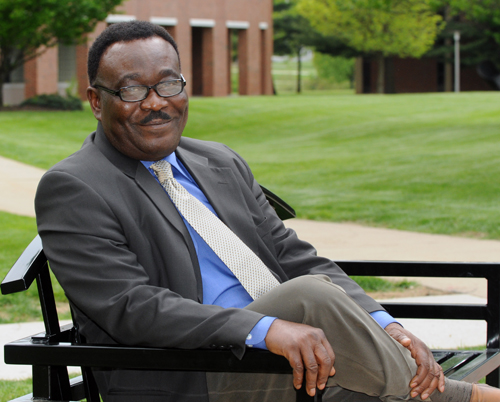Friday, May 21, 2010
It’s not uncommon for professors to take pride in knowing they’ve had a positive influence on their students – hundreds of them, perhaps even thousands. But what about those who help steer policies that affect humanity and compassion across the globe? At Rider, C. Emmanuel Ahia, Ph.D., J.D., can claim both distinctions.
Ahia spent a week this spring at the prestigious Oxford Round Table on Ethics and Law at Hertford College, one of the constituent colleges of the University of Oxford in England, where the associate professor of Counseling presented his paper on how mental-health ethical principles can inform public policy. The papers presented at the Oxford Round Table often become essential policy guides and best practices for a number of corporate, educational and governmental bodies, including the United Nations.
Ahia has devoted more than 30 years exploring the relationship between the law and mental health, a link he says is substantive.
“Many mental-health issues can arise from legal problems,” said Ahia, who has taught at Rider since 1990. “Divorce, abusive drinking, or any number of problems with the law can cause major mental issues that mental-health professionals must respond to.”
Ahia’s presentation at the Oxford Round Table, however, adapted a more global focus, examining prisoners of war and the effects of their treatment in captivity. It’s a relevant issue, one that currently affects many thousands of military combatants, but also one close to his heart. Before coming to the United States in the late 1970s, Ahia served in the military in his native Nigeria. “I don’t like war,” he said, citing his primary reason for leaving his homeland. “Nations have to show that toughness, but war offers no solutions to permanent problems.”
Despite this belief, Ahia’s interest in humane treatment for POWs is much less political than it is personal. “I am motivated by taking care of people,” Ahia said, emphasizing the word. “But even as a matter of military policy, you gain more from good treatment of these POWs than you do from abusing them. In all respects, it is better to treat them with dignity.”
Since his arrival in the United States, Ahia has built an academic résumé that helps explain his specialization in mental-health law. With graduate and doctoral degrees in counseling, as well as a doctorate in law, he is able to integrate his compassionate nature with his ability to navigate the often labyrinthine legal system.
“It allows me to remain a consultant to Rider Counseling graduates who may be facing legal and/or ethical challenges in their practice,” said Ahia, who also provides academic mentorship to numerous alumni who have continued their quests for doctoral degrees.
“I know the legal practice and I have the skills to practice law, but it’s not an environment I enjoy, the ‘lose-or-win’ situation,” Ahia explained of his decision to be a teacher and counselor above an attorney. “What I enjoy is seeing people doing well, and seeing them happy. I feel more fulfilled by that than by money.”

